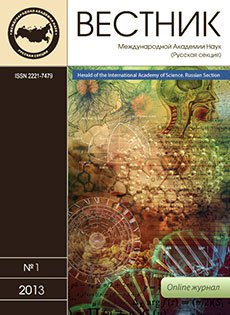Issue #1, 2013

PROBLEMS OF ECOLOGY, EDUCATION, ECOLOGICAL CULTURE, EARTH SCIENCES
Ecological Culture of Thinking: Development Modeling
On the base of Metasystem approach the way to cultivate the eco-cultural abilities, forming of high level development of mental abilities on intellectual, motivational and self-correctional types in modeling of ecological thinking development has been shown in the paper. Keywords: ecological culture, simulation development, environmental activities, thinking, reflection, ability.
Updated case study of ecological culture in akmeology. Ecological culture is revealed as a form of thinking, self-determination, self-relations, self-correction. The ideological, ethical, competency-based and favourable case at implementation of components development of ecological culture. Key words: human, ecological culture, personal-professional development, vertex.
Educational Space of Development of Ecological Culture as Humanitarian Technology
Notions «social technology», «pedagogical (educational) technology» and «humanitarian technology» are analyzed in the paper, and the components of ecological education are considered. Key words: ecological education, social technology, pedagogical (educational) technology, humanitarian technology, the components of ecological education.
In the context of the research study of the influence of information space on the subjective relation of children and young people to nature, are in the article children\'s and youthful press examined, its potential in the development of the environmental culture of personality and condition of effective realization, including the ecologically oriented information activity of children and young people. Keywords: environmental culture, information space, subjective relation to nature, information activity, the ecological education.
Natural and Social Humanitarian Foundations of Ecological Deontology
The article considers the natural scientific, social and humanitarian reasons/ foundations of ecological deontology, the feasibility of its ideas and components of the in social practice using the tools of ecological law and ecological ethics. Key words: ecological deontology, ecological imperative, ecological law, ecological ethics.
Humanitarian Aspects of Geoecology
The features of available ecosystems depend on the level of ecological culture, which determines the effectiveness of decision\'s acceptance about the conservation of environmental parameters. Global cities form the culture-informational space in with humanitarian technology is created. The latter helps to ameliorate the ecological situation. Key words: expenditure of energy, humanitarian technologies, global city, transit space.
MEDICAL AND BIOLOGICAL SCIENCES
Brain Psychic Activity:«Clue» for Understanding
The paper discusses the origin of a human subjective state. The goal of this study is to future explore the human subjective states which are can be registered remotely and objectively. Recently we have established the existence of a «psychogenic field», which are most likely reflecting on the human brain subjective state. The author analyses the remote influence of a human subjective state on the blood physical and chemical parameters. We have submitted the schematic diagram of formation of subjective human brain activity, based on biofeedback action of a psychogenic field to the neural molecular processes (a self-induction in a brain). The paper describes the interrelation of neurophysiologic and subjective processes in the system organization of goal-seeking behavior and suggests a paradigm presuming the existence of physical phenomena unique for the living brain and brain fields, and their role in the origin of a subjective state. Key words: mentality, consciousnes, subjective state, brain, psychogenic field, paradigm of a subjective state origin.
Ecology and Pulsation of Cells
Opening of the metabolic component in the rise of water from the root to the leaves with a new force raises the problem concerning mechanisms of heat conversion of ATP hydrolysis in the mechanical work. Periodic changes of cells volume which leads to a rise in water, connected with pulsating change of hydration cytoskeleton protein molecules. Key words: hydrolysis, heat, work, hydration, cytoskeleton, protein molecules, ecology.
PHYSICS, CHEMISTRY, TECHNICAL SCIENCES, EXACT SCIENCES
Essentially new hydrothermal method for producing glass-making raw material «Kanazit» on the basis of amorphous clint. Advantages: The new energy
HUMANITARIAN SCIENCES
Evolutionary-Institutional Approach in Forming of Labour Market Regulation Model
Labour market due to the numerous modern researches is investigated from the point of global increasing supply of labor force which misbalanced the national labour markets of developed countries, and deeply influenced on the system of wages what formed the so-to-say «highly professional and at the same time low paid» economics. Modern labour market is used to be the evolutionary system based on the cross-countries migration flows, reflected in the willingness of States to orientate its forming in the maximized suitable social and economic trend. Thou the author\\\\\\\'s research is to concrete the evolutionary-institutional approach to the Russian labour market investigation in the circumstances of integration and globalization. Key words: evolution, evolutionary-institutional approach, labour market, the quality of the labour force, labour migration flows.
The article is dedicated to analysis typical features of contents of the notions «a consciousness» and «the person ecological consciousness» and the types of the person ecological consciousness are considered. Key words: consciousness, person ecological consciousness, anthropocentric type of ecological consciousness, naturecentric type of ecological consciousness, ecocentric type of ecological consciousness.
Ecological Competence as Future Designer\'s Personality Integrative Component
With an open perspective of higher education development in line with eco-pedagogical and competence approaches the ecological competence concept of the individual as an immanent part of professional competence and ecological competence as a key competence in the professional education comes to the fore. In this case professional competence is considered as an ascent step from simple literacy improvement to personality\' development as a subject of culture in the «Literacy — Education — Professional competence — Culture — Mentality» algorithm.
On the Concepts of «Ecological Culture» and «Ecological Competence»
We present an analysis and correlation of the concepts of « ecological culture of personality,» and « ecological competence of personality» in the modern educational process. Key words: ecological culture of personality, ecological competence of personality.
Competence-Based Approach as a Factor of Students Socialization in Pedagogical High School
The article gives a brief analysis of basic trends in the modern professional education. The necessity of environmental awareness formation within the competence approach with its socialization component is postulated. Key words: environmental awareness, competence approach, socialization, professional socialization.